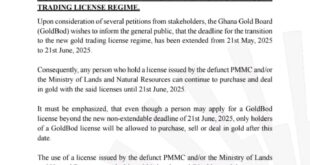The recent increase in Value Added Tax (VAT) rates in Ghana has sparked concerns among business owners, with the Ashanti Business Owners Association expressing their dissatisfaction.
According to the association’s Executive Secretary, Mr. Charles Kusi Appiah Kubi, these tax hikes are adversely affecting Ghanaian businesses and even ordinary households.
While Mr. Appiah Kubi acknowledges the need for governments to generate revenue through taxes, he argues that the new VAT rates and the inclusion of more businesses in the VAT net are damaging to the economy.
He believes that these changes will hinder small businesses’ access to credit facilities and impede their ability to grow.
The Executive Secretary has called upon the government and the Ministry of Finance to address the issue of VAT rates, particularly concerning financial services and other sectors.
He emphasizes that such measures are necessary to alleviate the burden placed on businesses and protect the overall health of the economy.
“The concerns raised by the Ashanti Business Owners Association reflect the anxieties of many Ghanaian entrepreneurs who are grappling with the challenges posed by these tax increases.
“Small and medium-sized enterprises (SMEs) form the backbone of the Ghanaian economy, and their ability to thrive directly impacts employment rates, economic growth, and poverty alleviation efforts.
“It is essential for the government to carefully consider the implications of these tax policies on businesses and households, he said.
Mr. Appiah Kubi then urged government that while taxation is a crucial tool for revenue generation, it should be implemented in a manner that balances the need for funding with the preservation of a conducive business environment.
“The government must take proactive steps to engage with business owners, associations, and other stakeholders to find solutions that promote sustainable growth.
“This could involve revisiting the VAT rates, introducing exemptions or incentives for SMEs, and exploring alternative revenue sources to reduce the burden on businesses.
“Again, the government should prioritize measures that facilitate access to credit for small businesses, as this will contribute to their expansion and create employment opportunities.
“By providing targeted support to entrepreneurs, Ghana can nurture a thriving business ecosystem and foster economic resilience, he added.
The current VAT rates in Ghana are negatively impacting businesses and households.
The concerns expressed by the Ashanti Business Owners Association highlight the urgent need for the government to address these issues.
By carefully evaluating and modifying tax policies, fostering dialogue with stakeholders, and implementing supportive measures, Ghana can pave the way for a sustainable and vibrant business environment that benefits all.
THANK YOU for constantly reading stories on MyGhanaMedia.com, news publishing website from Ghana. Kindly like, follow, comment and SHARE stories on all social media platforms for more entertaining updates!
Follow us on Twitter: https://twitter.com/
Source: MyGhanaMedia.com / Nana Yaw Owusu/ Ashanti Region.
There are four types of content published on MyGhanaMedia.com daily: curated content; syndicated content; user-generated content; and original content.
 MYGHANAMEDIA.COM Best Source Of Latest News
MYGHANAMEDIA.COM Best Source Of Latest News





